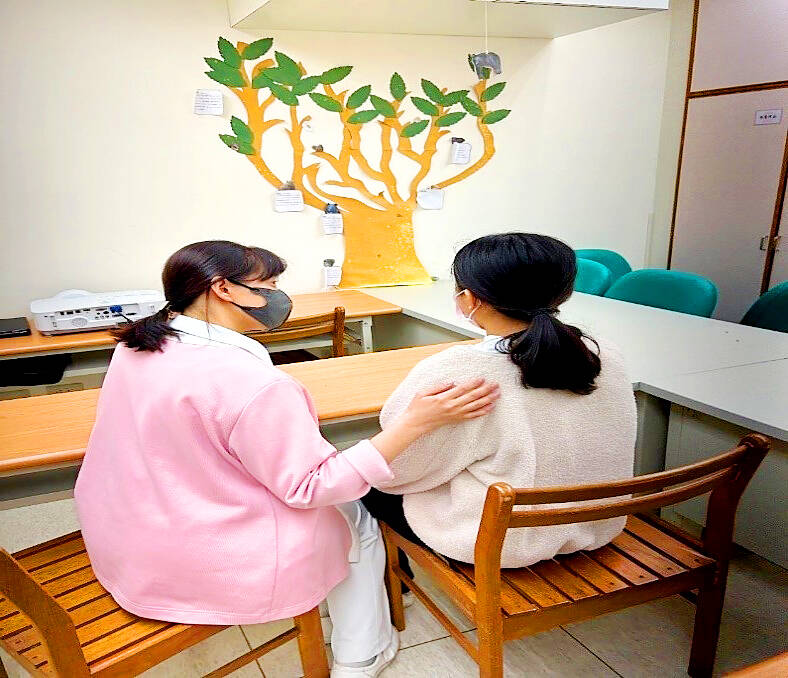Nearly 85 percent of the more than 130,000 people in Taiwan with a chronic mental illness rely on family members for help, but many of those caregivers do not reach out for support out of fear of discrimination, which can lead to stress and isolation, experts say.
Last year 133,643 disability ID cardholders were listed as having a chronic mental illness, an increase of 1,187 people from the previous year, Ministry of Health and Welfare data showed.
Among them, 84.88 percent lived with a family member who served as their caregiver, providing emotional support and assistance with daily activities, the data showed.

Photo courtesy of Taipei Veterans General Hospital
Although the ministry received 5,806 calls to its family caregiver and consultation service, relatively few were regarding mental illness, it said.
Caregivers for people with mental illness are reluctant to ask for help out of fear of discrimination, increasing their sense of isolation, a social worker said.
Alliance for the Mentally Ill of ROC, Taiwan chairwoman Chen Hsien-chi (陳仙季) on Sunday said that some caregivers develop depression.
As the onset of many mental disorders occurs at a young age, the period of caretaking is relatively long, Chen said.
Caregivers typically go through four mental stages: First, they ask “why did a normal person suddenly become like this?” she said.
Sometimes, gifted and talented students suddenly start getting poor grades after attending university, or young people develop mental illness after entering the military, which can be a major blow to their family, she said.
Next, caregivers might think “there must be a way to cure the illness” and start taking the family member to see doctors, only to find that their loved one’s condition would not change, or they might experience side effects from medication, she said.
After gaining insight into the illness, the caregivers could enter a phase of “coexisting with the illness,” but expect the person to at least finish compulsory education, so the caregivers might then have to accompany them to school, Chen said.
Finally, they go “beyond their imagination of the illness” and develop empathy for their family member, hoping to achieve progress while ensuring stability, and gradually let them integrate into society, she said.
Psychologist Chen Chien-hao (陳建豪) said he is not the primary caregiver for his sister who has depression, but provides important support for his parents, who take care of her.
Family members play different roles in caring for a person with mental illness, and that responsibility should not fall solely on one person, he said.
For example, he said he listens to his parents talk about their emotions.
“My mother always cries when she talks about my sister” because she is worried his sister would interpret her words negatively and it would create conflict, he said.
His mother also worries his sister might start a fire while sleepwalking, a side effect of the antidepressant she takes; that she might leave home by herself; or that she would be unable to control her illness if she stops taking medication, he said.
Chen Hsien-chi said that depression can occur at any age.
People with mild depression need support and companionship to help recognize the value of their lives, while people with severe depression might develop self-harming behaviors, she said.
A big challenge for their caregivers is that “they do not know what the person will do,” so they are always on alert, but feel unable to prevent all incidents, she said.
Schizophrenia is more complicated, as it commonly co-occurs with depression.
Their caregivers worry that their loved ones might hurt somebody, as there have been cases of people with schizophrenia getting into conflicts, such as a man who fought with a neighbor because he thought a mosquito repellent incense the neighbor had lit was poisonous, Chen Hsien-chi said.
When dealing with people who have depression, do not try to deny their experience or tell them not to overthink things, she said.
Instead, listen to them and empathize with them, and tell them: “I know you are feeling terrible, but you can talk about it, and I will listen and be by your side,” she said.
Psychiatrist Yang Tsung-tsair (楊聰財) agreed, saying not to tell people with depression “other people suffer more than you” or “I hope you get better,” as if they are common personal problems, but instead show more empathy by encouraging and accompanying them.
Ministry of Health and Welfare Department of Mental Health Deputy Director Cheng Sheu-shin (鄭淑心) said the ministry plans to establish a mental health center for every 330,000 people.
It had already established 48 centers as of the end of last year, with at least one in every city or county, receiving more than 570,000 visits last year, Cheng said.
The ministry aims to increase the number of centers to 53 by the end of this year, and 71 by the end of next year, she said.
A National Health Research Institutes study shows that if people hospitalized for schizophrenia for the first time receive a long-acting injection of antipsychotics as treatment, the hospital readmission rate for the disorder can be reduced 15 to 20 percent, Cheng said.
The government in 2022 began allocating a special budget of NT$2.7 billion (US$82.73 million) per year for long-acting injections of antipsychotics, and more than 54 percent of that budget was used in the first year, she said, adding that it improved the stability of patients’ conditions and their quality of life.
The acceptance rate of mandatory hospitalization reviews in the past five years was more than 90 percent, reaching as high as 95.45 percent last year, an increase of 3 percentage points compared with the previous year, ministry data showed.
The Department of Mental Health said that through education and training, mandatory hospitalization facilities and review committee members have formed a consensus on the conditions and criteria of mandatory hospitalizations.
The department said it is also establishing a “judicial psychiatric ward” for admitting criminal offenders with mental illness who are deemed at risk of violent behavior.

A magnitude 6.4 earthquake struck off the coast of Hualien County in eastern Taiwan at 7pm yesterday, the Central Weather Administration (CWA) said. The epicenter of the temblor was at sea, about 69.9km south of Hualien County Hall, at a depth of 30.9km, it said. There were no immediate reports of damage resulting from the quake. The earthquake’s intensity, which gauges the actual effect of a temblor, was highest in Taitung County’s Changbin Township (長濱), where it measured 5 on Taiwan’s seven-tier intensity scale. The quake also measured an intensity of 4 in Hualien, Nantou, Chiayi, Yunlin, Changhua and Miaoli counties, as well as

Credit departments of farmers’ and fishers’ associations blocked a total of more than NT$180 million (US$6.01 million) from being lost to scams last year, National Police Agency (NPA) data showed. The Agricultural Finance Agency (AFA) said last week that staff of farmers’ and fishers’ associations’ credit departments are required to implement fraud prevention measures when they serve clients at the counter. They would ask clients about personal financial management activities whenever they suspect there might be a fraud situation, and would immediately report the incident to local authorities, which would send police officers to the site to help, it said. NPA data showed

ENERGY RESILIENCE: Although Alaska is open for investments, Taiwan is sourcing its gas from the Middle East, and the sea routes carry risks, Ho Cheng-hui said US government officials’ high-profile reception of a Taiwanese representative at the Alaska Sustainable Energy Conference indicated the emergence of an Indo-Pacific energy resilience alliance, an academic said. Presidential Office Secretary-General Pan Men-an (潘孟安) attended the conference in Alaska on Thursday last week at the invitation of the US government. Pan visited oil and gas facilities with senior US officials, including US Secretary of the Interior Doug Burgum, US Secretary of Energy Chris Wright, Alaska Governor Mike Dunleavy and US Senator Daniel Sullivan. Pan attending the conference on behalf of President William Lai (賴清德) shows a significant elevation in diplomatic representation,

The Taipei City Reserve Command yesterday initiated its first-ever 14-day recall of some of the city’s civilian service reservists, who are to undergo additional training on top of refresher courses. The command said that it rented sites in Neihu District (內湖), including the Taipei Tennis Center, for the duration of the camp to optimize tactical positioning and accommodate the size of the battalion of reservists. A battalion is made up of four companies of more than 200 reservists each, it said. Aside from shooting drills at a range in New Taipei City’s Linkou District (林口), the remainder of the training would be at